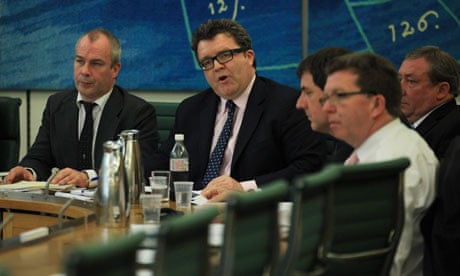MPs on the culture, media and sport select committee had six weeks to consider the statement that Rupert Murdoch was "not fit" to run a major corporation before a final vote that left them split along party political lines, the Guardian has learned.
A Conservative member on the committee, Louise Mensch, criticised Labour colleagues for inserting the incendiary sentence, saying the committee had "not for one moment" discussed it before the final vote on Monday, the day before the report was published.
But the Guardian has seen a copy of papers circulated to committee members on 20 March that first set out the Labour MP Tom Watson's amendment, including the conclusion that Murdoch was "not a fit and proper person to have the stewardship of a major international company".
Mensch and the Labour committee member Paul Farrelly have confirmed that the papers were discussed at a meeting of the committee on 27 March. When the MPs arrived at Watson's amendment, the committee chair, John Whittingdale, announced that it would be too controversial to get a consensus agreement and should not be discussed until the final meeting on 30 April, when disputed amendments would be put to the vote.
The version of the amendment MPs voted on at the final meeting was slightly different to that in the 20 March papers, but still included the key "not fit" phrase.
The vote split the committee, with the Conservatives refusing to support the final report. This rendered it "partisan and essentially worthless", Mensch said on BBC2's Newsnight programme on Tuesday.
Her comments were widely interpreted as a suggestion that the "not fit" claim had been sprung on the committee at the last minute by Watson, a suggestion denied by fellow committee members.
The amendment was "certainly" discussed before the Monday meeting, Farrelly told BBC Radio 4's Today programme on Wednesday.
The chain of events appears to support Mensch's claim that the crucial amendment was not "discussed". But the Liberal Democrat committee member, Adrian Sanders, whose vote with the five Labour members gave them a majority in favour of the "not fit" amendment, rejected the suggestion that MPs had no prior warning.
"The idea suddenly this was completely new – I'm afraid I don't go along with that idea," he said.
Later Farrelly stood by his account, suggesting Mensch's version of events was correct in fact but conveyed a misleading impression. "I don't want to get drawn into personal arguments, as they detract from the strong corporate conclusions, including 'wilful blindness' at the organisation," said Farrelly. "The semantics of what was meant by 'not discussed until Monday' are all very well. But any implication that this was a last-minute bolt-from the blue from Tom is completely wrong."
The subject was implicitly discussed throughout the committee's long inquiry, Sanders said: "In a sense it ran through the whole inquiry – whether it was written down in those terms [or not]."
Labour MPs on the culture committee also disclosed that they will not seek to amend the motion put to the Commons on the three News International executives found to have misled parliament. The decision means there will be no attempt to pass an amendment declaring either that Murdoch is not a fit and proper person to run a company, or that he has misled MPs.
Discussions are underway on how the issue of misleading parliament will be handled by the Commons authorities, including whether the three former executives would be required to apologise in person. Any apology would imply guilt at a time when they may face criminal charges.
